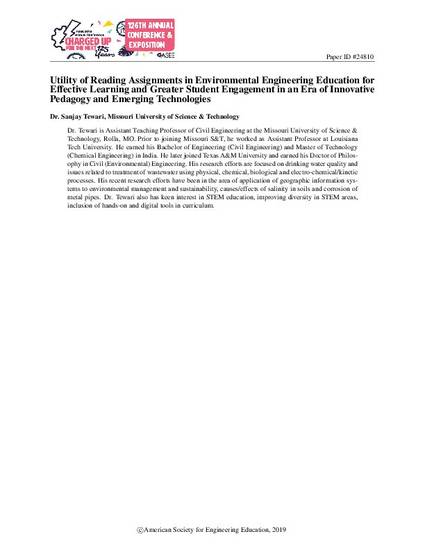
Making teaching more effective has been a never-ending pursuit since the dawn of education. Engineering education is no exception to this. There have been numerous pedagogical advances making engineering education more effective. Most engineering majors, some more than others, have dedicated laboratories for hands-on learning of specific concepts and techniques. However, a major portion of teaching still takes places in classroom settings. Educators adopt various pedagogical practices, teaching-aids, and technologies to engage students in the controlled environment of classrooms. In ideal class settings, an instructor should be able to reach out to all students regardless of their learning styles. Introductory environmental engineering usually requires extra text-reading than other courses. The availability and quality of supplementary material have improved with time but the material is not comprehensive and still lack variety. Reading, especially long texts, usually is not the top priority for a typical engineering student for various reasons. Textbooks are a source of significant information and an engineering student must be able to read texts with an intent to learn, to locate specific information, to understand difficult ideas and to gain an overview of the concept. Moreover, environmental engineering students should prepare themselves for reading technical reports and papers once they enter their profession of environmental engineering. While there is a lot of information available about the importance of reading assignments in general, there is a significant lack of similar information in the context of engineering students, especially environmental engineering students. This paper tries to fill in this gap with a small group of students enrolled in an introductory environmental engineering class. The study focuses on students' performance in the class with and without reading the assignments. It also summarizes and analyzes their experiences and responses to reading assignments which fall in one of the many categories such as too short, too long, too theoretical or too close to real-life situations. The class was a mix of traditional as well as non-traditional students. Students were also surveyed about self-reading versus assigned reading, and search-yourself versus given/pointed material. Lessons learned from this study and understanding students' perspective on reading assignments has helped the author in implementing the reading assignments in other courses in a far better manner. However, the small sample size of the studied students was an issue in this study. The author plans to expand this study over multiple semesters and involve other courses of civil engineering and other engineering majors taught by fellow faculty. It is hoped that a larger sample size composed of students with varied background and majors would provide a better understanding.
Available at: http://works.bepress.com/sanjay-tewari/26/
